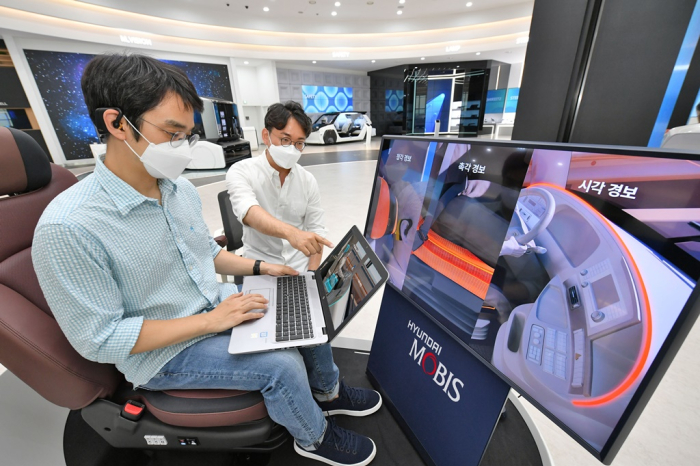Future Mobility
Hyundai Mobis targets in-vehicle healthcare with brainwave technology
M.Brain is the first system to apply brainwave measurement technology to the auto industrty
By Jul 21, 2021 (Gmt+09:00)
2
Min read
Most Read
LG Chem to sell water filter business to Glenwood PE for $692 million


KT&G eyes overseas M&A after rejecting activist fund's offer


Mirae Asset to be named Korea Post’s core real estate fund operator


StockX in merger talks with Naver’s online reseller Kream


Meritz backs half of ex-manager’s $210 mn hedge fund



South Korea’s top auto parts maker Hyundai Mobis has developed a new brainwave detection technology that monitors a driver's physical and psychological state in a move to target the global in-vehicle healthcare market.
Hyundai Mobis plans to introduce M.Brain, a new monitoring system based on brainwaves, to public bus services in Gyeonggi Province surrounding the capital Seoul on a trial basis, the Hyundai Motor Co. affiliate said on July 21.
M.Brain is the first system targeting the global auto industry that applies technology to measure brainwaves, the most difficult area to monitor among biological signals, Hyundai Mobis said in a statement. The company spent three years in research and development (R&D) for the technology and adopted machine learning to interpret the brainwave signals.
M.Brain measures a driver’s condition on a real-time basis by detecting brainwaves through earpiece sensors. By analyzing the brainwaves, the system checks the driver’s level of drowsiness and overall physical condition.
If a driver is dozing off, for example, M.Brain linked to a smartphone app alerts them to prevent an accident. Other alarm devices such as light-emitting diodes (LEDs) which light up around the driver’s seat, vibrating seats and speakers activated through the headrest also go off if the driver is shown to be losing alertness.
Starting with public buses in Gyeonggi Province, Hyundai Mobis plans to work with other local governments and transportation industries to apply the system to commercial vehicles. It is also targeting the global in-vehicle healthcare market with accumulated data on brainwave analysis. M.Brain can also be applied to self-driving cars.
The automotive healthcare technology has been focusing on passengers' safety and convenience. A fully autonomous driving vehicle can provide customized services to passengers by checking their needs after integrating biological signals such as brainwaves. When it detects a biological signal that indicates a passenger's need to take a break, for example, artificial intelligence changes the inside of the vehicle into a sleep mode. In case of a sudden medical emergency, it is expected to introduce technology that allows the cars to drive to the nearest emergency room on their own.
Write to Hyung-Kyu Kim at khk@hankyung.com
Jongwoo Cheon edited this article.
More to Read
-
 Business & PoliticsTrump Jr. meets Korean business chiefs in back-to-back sessions
Business & PoliticsTrump Jr. meets Korean business chiefs in back-to-back sessionsApr 30, 2025 (Gmt+09:00)
-
 Korean chipmakersSamsung in talks to supply customized HBM4 to Nvidia, Broadcom, Google
Korean chipmakersSamsung in talks to supply customized HBM4 to Nvidia, Broadcom, GoogleApr 30, 2025 (Gmt+09:00)
-
 EnergyLS Cable breaks ground on $681 mn underwater cable plant in Chesapeake
EnergyLS Cable breaks ground on $681 mn underwater cable plant in ChesapeakeApr 29, 2025 (Gmt+09:00)
-
 Business & PoliticsUS tariffs add risk premium to dollar assets: Maurice Obstfeld
Business & PoliticsUS tariffs add risk premium to dollar assets: Maurice ObstfeldApr 29, 2025 (Gmt+09:00)
-

Comment 0
LOG IN


